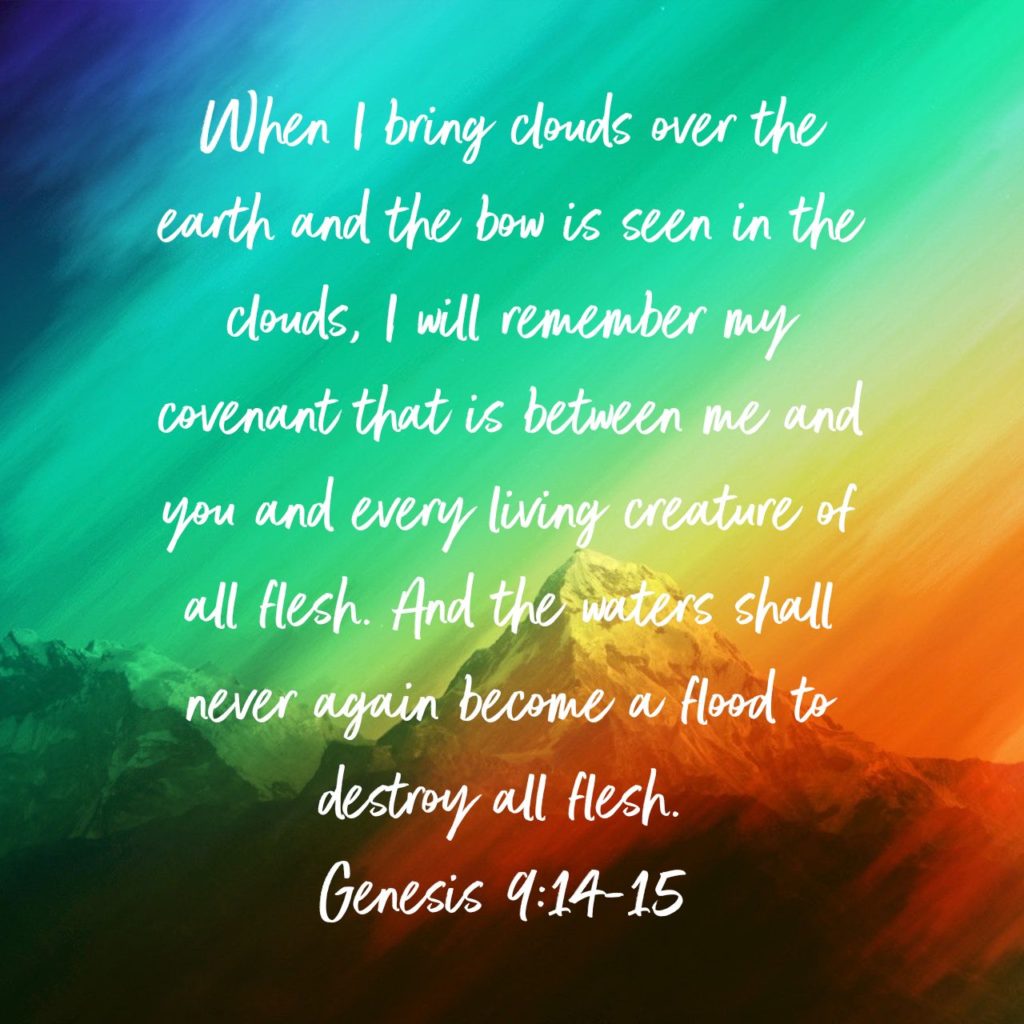
1 And God blessed Noah and his sons and said to them, “Be fruitful and multiply and fill the earth.
After the offering made by Noah prompts God to promise to never strike down all life while the earth remains, God issues a command similar to the one he gave Adam and Eve, to be fruitful and multiply. Noah and his family are tasked with essentially repopulating the earth.
2 The fear of you and the dread of you shall be upon every beast of the earth and upon every bird of the heavens, upon everything that creeps on the ground and all the fish of the sea. Into your hand they are delivered.
Instead of having dominion over the animals, as Adam and Eve had, God places the fear of mankind into the animals. This breaks the relationship between animals and humankind. Whereas before, the animals would have respected mankind, now they flee in terror of them. This of course can still be seen today, and while there are some cases where animals can be domesticated, most wild animals try to steer clear of mankind when they can. In a sense Mankind still rules over the animals, just not in the same way as before.
3 Every moving thing that lives shall be food for you. And as I gave you the green plants, I give you everything.
God now allows for animals to be eaten as food, which explains why animals come to fear mankind. It is unclear as to why God only now allows for the consumption of animals, perhaps it was to give mankind another reason to keep flocks besides just for sacrifices and burnt offerings. With animals now afraid of mankind, mankind would have to work to keep animals available for sacrifice and consumption. Notice also that God allows all moving things to be consumed. At this point there is no distinction between clean and unclean animals in regards to food.
4 But you shall not eat flesh with its life, that is, its blood.
The restriction on consuming blood is an interesting one. The Hebrew understanding of blood is that it contained the life essence of a person or animal, which was not to be consumed, but only offered to God as a sacrifice, or a payment of sin. In a more practical sense, this encouraged the preparation and cooking of meat, and probably helped prevent the spread of disease.
5 And for your lifeblood I will require a reckoning: from every beast I will require it and from man. From his fellow man I will require a reckoning for the life of man.
6 “Whoever sheds the blood of man,
by man shall his blood be shed,
for God made man in his own image.
God also places special significance on the blood of mankind. Rather than continue His previous policy where he would not let anyone kill Cain, God takes a stricter position. Anyone or anything that kills a human being is to be put to death. This will become the basis for most laws regarding fairness, life for life, eye for an eye, tooth for tooth, etc.
Notice that God still describes man as “made in God’s image.” Even after becoming such a wicked race that God decided to erase all life on earth, He still loves mankind, and recognizes us as being made in His image even when we are so different from Him, and so tainted by sin. There is still some semblance of the image of God in mankind.
7 And you, be fruitful and multiply, increase greatly on the earth and multiply in it.”
God again repeats this command to Noah and his sons.
8 Then God said to Noah and to his sons with him, 9 “Behold, I establish my covenant with you and your offspring after you, 10 and with every living creature that is with you, the birds, the livestock, and every beast of the earth with you, as many as came out of the ark; it is for every beast of the earth. 11 I establish my covenant with you, that never again shall all flesh be cut off by the waters of the flood, and never again shall there be a flood to destroy the earth.”
This is the first mention of a covenant of God. A covenant is a strong contract between two parties, so strong that the punishment for breaking a covenant is usually death. In this case the two parties are God, and every living thing after the flood, and the stipulation is that God will never destroy the earth by flood again. God places no stipulations on the opposing party, in this sense the covenant is one sided, with God being the only one burdened by the covenant.
12 And God said, “This is the sign of the covenant that I make between me and you and every living creature that is with you, for all future generations: 13 I have set my bow in the cloud, and it shall be a sign of the covenant between me and the earth. 14 When I bring clouds over the earth and the bow is seen in the clouds, 15 I will remember my covenant that is between me and you and every living creature of all flesh. And the waters shall never again become a flood to destroy all flesh. 16 When the bow is in the clouds, I will see it and remember the everlasting covenant between God and every living creature of all flesh that is on the earth.” 17 God said to Noah, “This is the sign of the covenant that I have established between me and all flesh that is on the earth.”
As a sign for the covenant, God creates a rainbow. The rainbow acts in the way that a signature would on a contract, it is a sign that the parties involved agreed to the contract. While God says that it is a reminder for him, it is probably meant as more of a comfort for mankind. If the understanding that there was no rain before the flood, the first rainfall after the flood would have been a great cause of concern. Was God about to destroy the earth again? Seeing the rainbow, one of the most beautiful natural phenomena, in the midst of the same force that recently destroyed all life on earth would have been most comforting.
It should be noted that God only promises to not destroy the earth by flood. There are still other paths of destruction He can take if He so chooses. Later books of the Bible make it clear that someday He will destroy the world again, and completely replace it with a new one.
18 The sons of Noah who went forth from the ark were Shem, Ham, and Japheth. (Ham was the father of Canaan.) 19 These three were the sons of Noah, and from these the people of the whole earth were dispersed.
Here the narrative takes a turn and begins to focus more on Noah’s family after the flood. His three sons are again mentioned, the patriarchs of all the nations of the earth.
20 Noah began to be a man of the soil, and he planted a vineyard. 21 He drank of the wine and became drunk and lay uncovered in his tent.
After the flood, Noah becomes a farmer, and obvious choice of profession seeing that he and his family would need food. One of his projects was a vineyard. It is unclear whether wine was ever made before the flood, or if Noah had any previous experience in a vineyard. In any case he could have very easily have gotten drunk by accident, being unaware of the effects of alcohol. However that is just speculation. At this point it becomes painfully clear that while Noah was “blameless in his generation” he was not without fault.
22 And Ham, the father of Canaan, saw the nakedness of his father and told his two brothers outside.
It is unclear what this expression means in this context. Throughout much of the Old Testament the phrase “saw the nakedness of” is a euphemism for sexual activity. Theories abound as to what happened. Perhaps Ham defiled his father homosexually. Maybe while his father was drunk, Ham slept with his mother. Or perhaps he simply made fun of the fact that his father was so drunk that he passed out naked. The text does not make it clear. In any case, what he did was sinful enough to elicit a strong response from Noah, as we shall see.
23 Then Shem and Japheth took a garment, laid it on both their shoulders, and walked backward and covered the nakedness of their father. Their faces were turned backward, and they did not see their father’s nakedness.
Whereas Ham exposed his father’s nakedness and shame, Shem and Japheth respectfully covered their father up, bringing him no shame.
24 When Noah awoke from his wine and knew what his youngest son had done to him, 25 he said,
“Cursed be Canaan;
a servant of servants shall he be to his brothers.”
There is much confusion as to why Noah cursed Canaan, rather than Ham. It is a stretch, but the language does allow for Canaan to be the one that shamed Noah, at the time being the youngest descendant (or youngest son) of Noah. Based on how Shem, Ham, and Japheth’s names are ordered in the text, Ham seems to the middle child, rather than the youngest. However Canaan, Noah’s grandson could be the youngest member of their family at the time of this event, and thus the one to cause all the trouble. While this position explains everything nice and neatly, it is stretching the limits of the language.
Another possible explanation is that Ham slept with his mother while Noah was drunk, and Canaan was the child that resulted, In this case the curse would be Noah’s way of distancing himself from the child. However this is also unclear. In any case what happened was disturbing, and Noah’s curse was a stern but proper response.
26 He also said,
“Blessed be the LORD, the God of Shem;
and let Canaan be his servant.
27 May God enlarge Japheth,
and let him dwell in the tents of Shem,
and let Canaan be his servant.”
Noah’s curse on Canaan includes the blessing of his other two sons. Notice that Shem is described as a follower of the LORD. Shem worships God, as his father did, and it is obvious. It is from the line of Shem that God will bring forth the Messiah. The blessing also gives the order of Noah’s sons in terms of importance. First there is Shem, the firstborn, and eldest. Then there is Japheth, who is probably the youngest. They are to rule over Canaan, Ham’s (likely youngest) son. Ham and his other descendants, receive no blessing at all.
28 After the flood Noah lived 350 years. 29 All the days of Noah were 950 years, and he died.
The closing verse of this section harkens back to the previous genealogy, in style and structure. So much so that if one were to remove the entire flood narrative it would tie right in seamlessly with the original genealogy. It marks a fitting end to the narrative, and provides the necessary transition to the next section of scripture.
